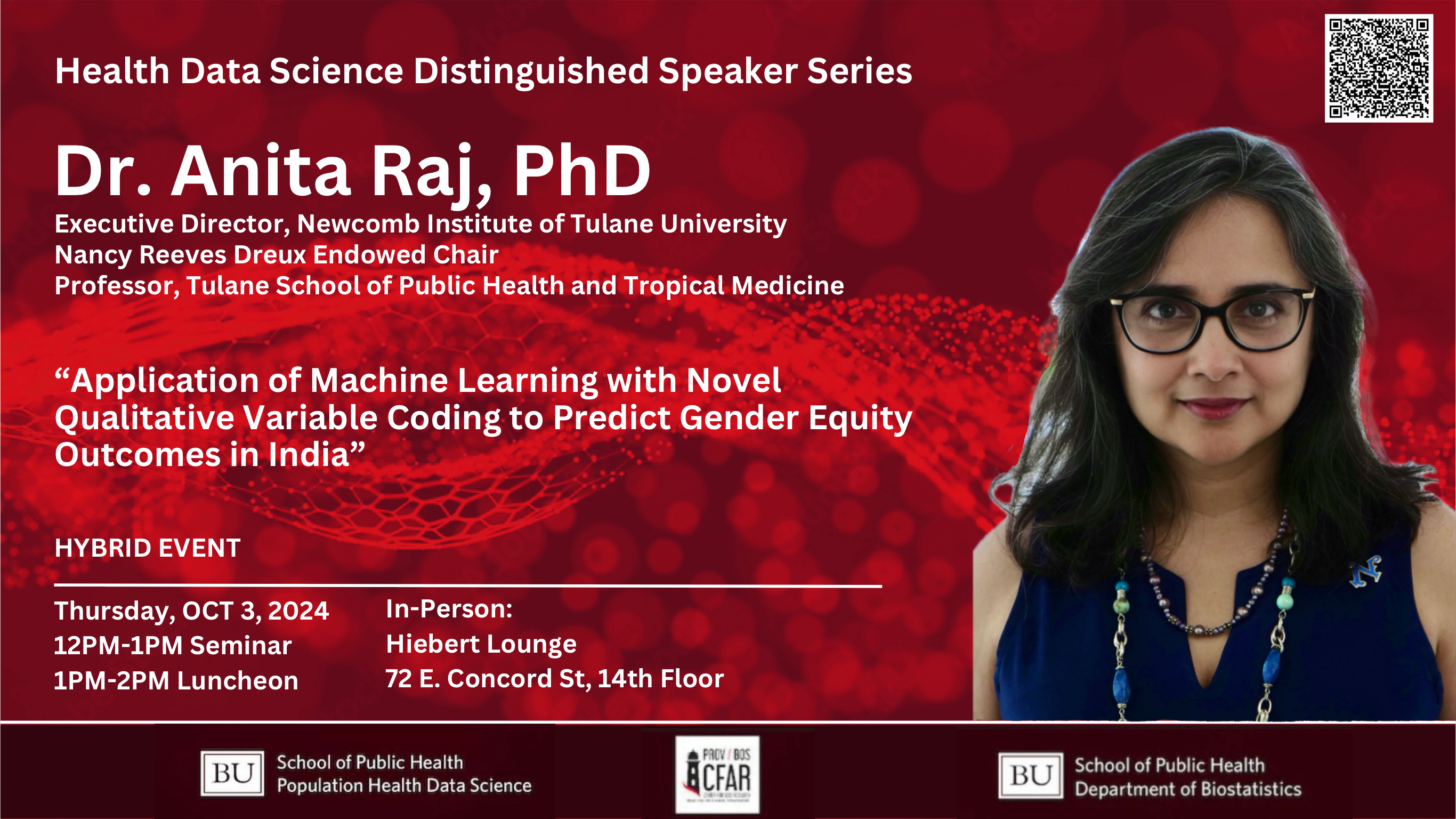OCT 3: Health Data Science Distinguished Speaker Series: Dr. Anita Raj, Tulane University
“Application of machine learning with a novel qualitative variable coding technique to understand predictors of gender equity outcomes in India”
October 3, 2024 | 12-1PM. Hiebert Lounge & Zoom.
Registration is now closed.
Abstract: We conducted a series of papers applying machine learning methodologies with a novel variable coding technique designed by our team to provide insight into key issues of gender equity with limited understanding due to limited data to guide hypothesis guided analyses. We conducted this series of papers using data from India’s National Family Health Survey (NFHS), the largest Demographic and Health Survey conducted in any country in the world, with sample sizes greater than 500,000 in some years. We used machine learning methodologies to identify key variables in areas of gender equity with more limited understanding in India with the goal of guiding hypothesis generation rather than hypothesis testing. Our areas of focus included child marriage, sexual violence, intimate partner violence, and use of intrauterine devices. We initiated this work with a focus on child marriage to test the analytic approach, as we have a history of research in this area and using the NFHS data, allowing us to validate as well as test the approach. For these papers, we analyzed data using a traditional regression model, with the above noted gender equity indicators as our dependent variable for each given paper, and we then were able to analyze 4000+ variables from the survey as the independent variables. We used three commonly used machine learning algorithms– Least Absolute Shrinkage and Selection Operator (lasso) or L-1 regularized logistic regression models; L2 regularized logistic regression or ridge models; and neural network models. Finally, we developed and applied a novel and rigorous approach involving expert qualitative review and coding of variables generated from an iterative series of regularized models to assess thematically key variable groupings associated with each outcome. Findings from across outcomes document generation of variables previously seen in the literature as related to our outcomes of focus, validating our proposed approach. At the same time, we were also able to generate variables and themes of variables not previously identified in the existing literature as related to the given outcome, allowing for theory expansion and broadening of hypothesis generation to understand these outcomes in India and across national settings.
Bio: Anita Raj is the Executive Director of the Newcomb Institute and the Nancy Reeves Dreux Endowed Chair in the School of Public Health and Tropical Medicine at Tulane University. She is a research scientist trained in developmental psychology and public health with a multi-disciplinary research focus on gender equity in global health and development. She has led federal grant and foundation-funded studies on gender theory and measurement science, sexual and reproductive health, maternal and adolescent health, women’s empowerment, and gender inequalities, including gender-based violence and child marriage. She has approximately 300 peer-reviewed publications and is recognized as one of the most cited social scientists globally. She created and leads the EMERGE platform, which provides open access evidence-based measures on gender empowerment, built indicators on gender empowerment in national surveys for global tracking of SDG5: Building gender equality and empowerment for all women and girls and offers technical assistance to survey researchers and implementers working on gender empowerment. She also created and leads the Violence EXperiences (VEX) study, now operating in California and Louisiana, to assess state-wide data on experiences of violence, discrimination, and mental health, to support data-driven policy decision-making on these issues. She has served as an advisor to UN Women, UNICEF, the World Health Organization, the Bill and Melinda Gates Foundation, the Blue Shield Foundation of California, and the David and Lucille Packard Foundation on gender equity and health as well as women’s empowerment issues, and she has been an invited speaker at the U.N. General Assembly on child, early, and forced marriage. She is also on the International Advisory Board for Lancet Global Health. She is the Co-Chair of the Committee on Gender Empowerment, Sociodemographic Development, and Population Dynamics for the National Academy of Sciences.
